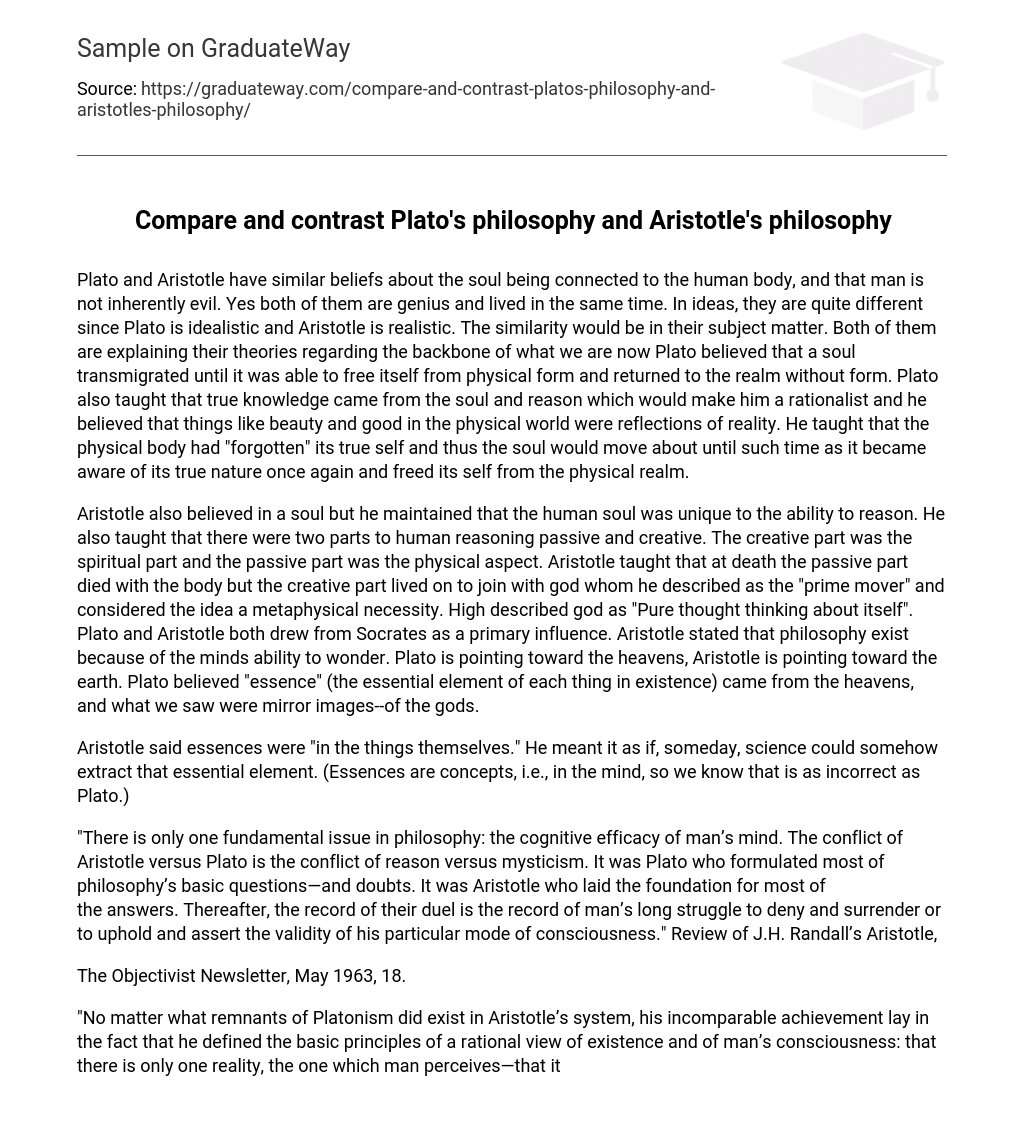Plato and Aristotle have similar beliefs about the soul being connected to the human body, and that man is not inherently evil. Yes both of them are genius and lived in the same time. In ideas, they are quite different since Plato is idealistic and Aristotle is realistic. The similarity would be in their subject matter. Both of them are explaining their theories regarding the backbone of what we are now Plato believed that a soul transmigrated until it was able to free itself from physical form and returned to the realm without form. Plato also taught that true knowledge came from the soul and reason which would make him a rationalist and he believed that things like beauty and good in the physical world were reflections of reality. He taught that the physical body had “forgotten” its true self and thus the soul would move about until such time as it became aware of its true nature once again and freed its self from the physical realm.
Aristotle also believed in a soul but he maintained that the human soul was unique to the ability to reason. He also taught that there were two parts to human reasoning passive and creative. The creative part was the spiritual part and the passive part was the physical aspect. Aristotle taught that at death the passive part died with the body but the creative part lived on to join with god whom he described as the “prime mover” and considered the idea a metaphysical necessity. High described god as “Pure thought thinking about itself”. Plato and Aristotle both drew from Socrates as a primary influence. Aristotle stated that philosophy exist because of the minds ability to wonder. Plato is pointing toward the heavens, Aristotle is pointing toward the earth. Plato believed “essence” (the essential element of each thing in existence) came from the heavens, and what we saw were mirror images–of the gods.
Aristotle said essences were “in the things themselves.” He meant it as if, someday, science could somehow extract that essential element. (Essences are concepts, i.e., in the mind, so we know that is as incorrect as Plato.)
“There is only one fundamental issue in philosophy: the cognitive efficacy of man’s mind. The conflict of Aristotle versus Plato is the conflict of reason versus mysticism. It was Plato who formulated most of philosophy’s basic questions—and doubts. It was Aristotle who laid the foundation for most of
the answers. Thereafter, the record of their duel is the record of man’s long struggle to deny and surrender or to uphold and assert the validity of his particular mode of consciousness.” Review of J.H. Randall’s Aristotle,
The Objectivist Newsletter, May 1963, 18.
“No matter what remnants of Platonism did exist in Aristotle’s system, his incomparable achievement lay in the fact that he defined the basic principles of a rational view of existence and of man’s consciousness: that there is only one reality, the one which man perceives—that it exists as an objective absolute (which means: independently of the consciousness, the wishes or the feelings of any perceiver)—that the task of man’s consciousness is to perceive, not to create, reality—that abstractions are man’s method of integrating his sensory material—that man’s mind is his only tool of knowledge—that A is A.
“If we consider the fact that to this day everything that makes us civilized beings, every rational value that we possess—including the birth of science, the industrial revolution, the creation of the United States, even the structure of our language—is the result of Aristotle’s influence, of the degree to which, explicitly or implicitly, men accepted his epistemological principles, we would have to say: never have so many owed so much to one man.”
Similarities between Socrates Plato and Aristotle?
Answer
Aristotle refers to Greek philosopher and scientist. Socrates was an old Greek Athenian theorist who was accredited as one of the creators of west culture philosophy. Plato was an old Greek philosopher, mathematician and a student of Socrates. The similarities between the two are that both were dissatisfied with the society they lived in and thought of ways to change it and were republican.
What Are the Similaritie in the Philosophical Views of Socrates Aristotle and Plato? Answer
Socrates, Plato, and Aristotle were students of each other. They had similar yet evolving ideas of social structure, life after death, the human condition, history and education.





